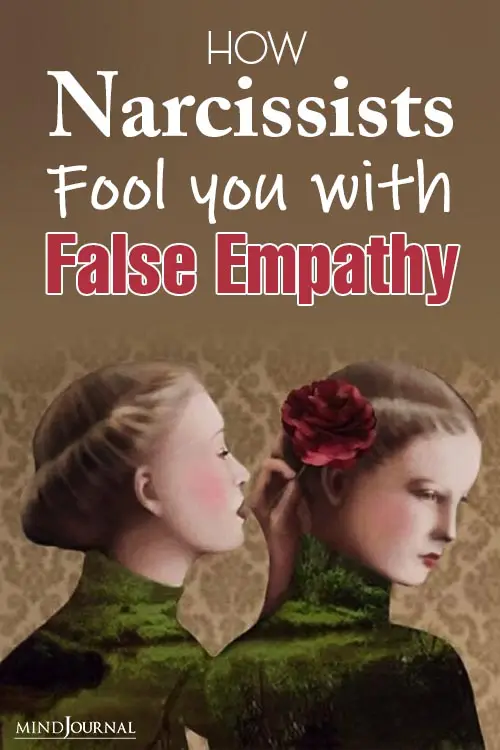I’ve often discussed the fact that the defining quality of a narcissist is the lack of empathy. Not only is this the one quality shared by all toxic narcissists, but it is also the “tipping point” into the “toxic” side of narcissism. In this post, we will discuss how narcissists use false empathy to fool you.
The fact is that narcissists cannot put themselves into your shoes and they cannot understand any type of pain you feel because they are not capable of it on an emotional level. But this explanation isn’t quite thorough enough, because it leaves so many of us wondering, “but what about all those times they did seem to be empathetic?”
For example, if your ex is a narcissist, they probably seemed to be fully aware of your feelings when you first started dating. After all, they very clearly knew what you liked. They made sure to give you what you liked, and they did their best to steer clear of what you didn’t like. This is one of those little things that made you feel like you’d finally found your soulmate – at least, at first.
So, I know what you’re thinking. If narcissists are not empathetic, then how could they ever act like they are? Isn’t this how empathy works? To be aware of and to choose your actions based on someone else’s feelings? Well, yes, and no.
Before we get into how narcissists are able to show empathy when it’s convenient for them, it’s important to understand what “real” empathy is, so let me define it for you.
What is Real Empathy?

My shorthand definition is that empathy is the ability to feel and care about how other people feel, and to act from that perspective. To be a little more clear, real empathy is the ability to sense, understand, and feel the emotions of someone else, even if you haven’t had an identical experience. It means being able to put yourself into someone else’s shoes. You can feel what they are feeling even if you cannot relate to what they are going through directly because you can sort of imagine how they must feel. You feel compassion for them and you care about their feelings because of this – and then you act accordingly.
Related: 22 Stages of Relationship Between An Empath and A Narcissist
What is False Empathy?
False empathy is sadly used as a manipulation tactic by narcissists when they want something from you. Since you value connection and empathy, as most non-narcissists do, the narcissist knows it will help them get what they want from you. So they pretend to care how you feel. See, when it comes to narcissists, they are unable to feel emotional and compassionate empathy. But at the same time, they are well-aware of the fact that other people value empathy and because of that, they might demonstrate false empathy. (Wait, what?) This is why it is so confusing and so difficult to detect a narcissist early in a relationship.
False Empathy: Understanding the Narcissist’s Empathy Deficit
Here’s the thing. When we say “narcissists have no empathy,” we don’t necessarily mean that they’re not capable of figuring out what you’re feeling. What we mean is that narcissists don’t FEEL empathy in the same way as most people do. They have no compassion, no remorse and they don’t feel regret – unless they regret a choice they made because it negatively affected them directly.
To put it more specifically, when someone feels compassion, it means they are sympathetic toward someone’s situation and they feel sort of compelled to help that person fix whatever is wrong or to at least not make anything more difficult for that person. When someone feels remorse, it means that they feel really guilty about something they did that they see as wrong. And when someone feels regret, it means they recognize that they made a choice or took an action that led to a negative consequence, and they wish they hadn’t done it or even that they could go back and change what they did.
So, in other words, the narcissist is capable of understanding exactly what you think or feel on a cognitive level, but not on an emotional one. They can “think about” what someone else is feeling, but it doesn’t affect their emotional state directly, nor does it play a part in how they treat the other person. The exception is when the narcissist thinks someone feels negatively about them. This situation will make them feel angry, offended, and generally upset – and that usually manifests in narcissistic rage and/or narcissistic injury.
The truth is that while narcissists find it easy to learn the motions on how to appear to be empathetic, they are usually just imitating what they’ve seen others doing – and that is when they use false empathy.
Types of Empathy
A lot of people don’t realize that there are different types of empathy as defined by psychologists, including cognitive, emotional, and compassionate empathy. And what is even more perplexing for a lot of us is that it is totally possible to demonstrate one or more of these types of empathy without actually caring on an emotional level what someone is feeling or going through.
Cognitive Empathy
As defined by psychologist Daniel Goleman in his 1995 book Emotional Intelligence, cognitive empathy is “simply knowing how the other person feels and what they might be thinking.” He adds that cognitive empathy is also sometimes called “perspective-taking.” In other words, it means being aware on an intellectual level of someone’s emotions and likely thoughts about any given topic or situation.
It’s like understanding that a coworker is sad that their grandma died, but since you didn’t know her, you might not feel personally sad about it. You tell them you’re sorry for their loss and offer to help them keep up on their workload while they attend the out-of-town funeral, but you don’t necessarily go home and cry about it.
Narcissists will use this kind of empathy as a way to manipulate you in the same way that a used car dealer would try to get you to buy an over-priced, underperforming vehicle. The salesperson doesn’t really care about the fact that you’ve got kids or that your budget is stretched. They’re more concerned about moving inventory and getting paid.
Yet, on an intellectual level, they can read you well enough to understand your thought process and what you’re looking for in a vehicle. And they can gather that you’re emotionally tied to this decision in some way, whether it’s due to a desire for a safe, dependable vehicle, or a desire for a pretty and stylish vehicle, or one that is super extra fast and powerful.
If they don’t have something in stock that fits your needs perfectly, the ethical thing to do would be to say so and possibly recommend another car lot. But they have the goal of moving their own inventory and making money, so they’ll do what they need to to make something they have work for you.
And while the car they ultimately talk you into buying may or may not be right for you, they will use this understanding of what you want to make it seem like exactly what you need. Sure, maybe it’ll cost way more than you can afford, or maybe it’ll have 300k miles on it – but these things aren’t a concern for the salesperson. They just want to sell you a dang car so they can go out to lunch, or buy that boat they’ve had their eye on, or whatever.
Related: The Ego Dynamic Between The Narcissists and Empaths
This is a great example of how a narcissist, while they have the ability to see things from your perspective, will always act in a way where they will benefit the most. In other words, they use cognitive empathy to get what they want by understanding what is important to you or what your perspective happens to be.
In fact, Daniel Goleman also notes that this is the kind of empathy used by people who use torture tactics. It allows them to understand what makes a person tick without feeling any sympathy toward them.
So, narcissists can and will use cognitive empathy to get what they want. But it doesn’t mean they can feel anything you feel, you feel me?
But, it’s all false empathy! Just remember that.
A twist on cognitive empathy is “agenda-driven” empathy. See, when the narcissist is getting what they want from you, they will pretend to know that you are making sacrifices for them. And they think by acknowledging that, they can convince you to be more willing to give up what you want for them.
For example, let’s say you’re excited about your upcoming friends’ night out. You’re going to see a movie you’ve been DYING to see. At the last minute, the narcissist you work with asks you to fill in for them the same evening, even though they were well aware that you wanted to go. They will say things such as “Oh I know you were looking forward to this but if you do this favour for me I will be forever grateful.” How can you turn that down?
Emotional Empathy
Emotional empathy is the type of empathy most of us think of when we call ourselves empaths. It means that you can sense and in some ways, actually feel what other people around you are feeling, even when they’re a stranger.
For example, if you watch someone on television stub their toe or get kicked in the shin, you sort of “feel” it along with them. It’s what makes us cry at movies and what makes us feel sad when someone we love is sad. It’s sort of like the feelings of other people become almost contagious for you. This can be seen in humans as early as two months old, when a baby will smile back at their mother smiling at them, or when the baby will cry when hearing another baby cry. Narcissists do not feel emotional empathy.
However, they might feel a sort of shallow empathy, which is when the narcissist shows a degree of softness for you. This happens most often early in a relationship during the love-bombing phase, and even then, if you look hard enough, you’ll see that they continue to show their true colors elsewhere. And of course, they will show their true colors to you eventually. It’s kind of like a doctor who has an amazing bedside manner but who is a total jerk to his wife and kids. Same deal.
Related: Dear Empaths: 4 Types of Narcissists You May Be Attracting
Compassionate Empathy
Compassionate empathy is exactly what it sounds like – being aware of and feeling for a person’s situation, and feeling moved to do something to help. It means keeping your head on straight but also caring about the other person’s feelings. It doesn’t necessarily involve being overly emotional, though you might be driven by emotion. It doesn’t necessarily involve being overly analytical or intellectual, though you might use your intellect to help them solve the problem. It simply means you understand what someone is experiencing and you might help them take action to resolve the issue. Narcissists do not generally have compassionate empathy, though they can be good at faking it when it helps them get what they want from you.
I hope you have understood how narcissists fool you with false empathy.
Related video:
Written by Angela Atkinson
Originally appeared on: Queenbeeing.com and is republished with permission.









Leave a Reply
You must be logged in to post a comment.